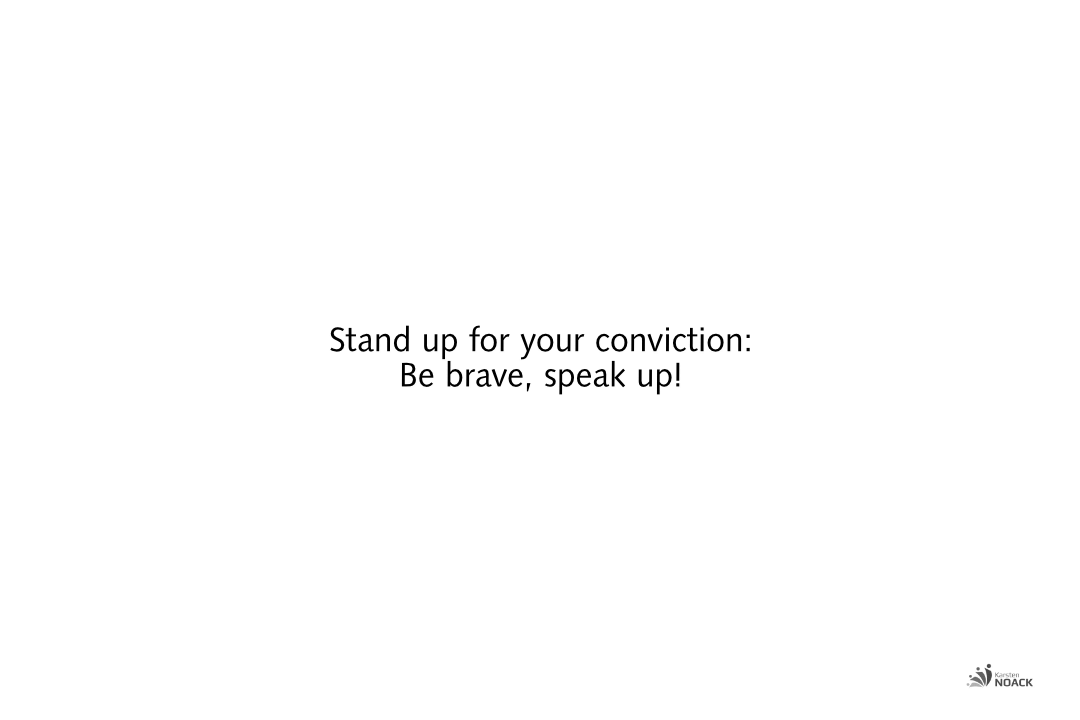15 Tipps on how to stand up for your conviction: Be brave, speak up!
How about your courage to speak up?
Stand up for your conviction
Some people have an opinion that deserves attention. Often, however, this opinion is not heard. Then it is time to decide whether to keep it that way or to share the point of view more clearly with others. Not everyone dares this step. What about you?
Overview
Hope is not the conviction that something will turn out well but the certainty that something makes sense, regardless of how it turns out.
Václav Havel
Why don’t we stand up for what is right?
I appear to me that too few people are willing to stand up for what is right. Too many times, we keep on complaining about the injustice in the world, but so few of us are willing to stand up and speak up. With little or no backing, those few who do speak up then inevitably find themselves victimized – and that while others watch in silence. Somehow, we completely miss the fact that when we do not speak up against injustice, we become complicit in it.
Why is it that when people observe something wrong being done or said, they simply cannot find the courage to speak up against it? Is it that we fear being victimized? Or do we fear being disliked?
We don’t want conflict
I know how hard it can be to speak up. Most of us want to be nice to other people. We don’t want conflict.
Sometimes we aren’t certain that we even know what we want to say, but we know we should say something. While searching for the perfect words, we may hesitate.
It takes courage to speak up
Yes, it takes courage to speak up. And when we start to speak our truth, we often don’t do it elegantly. Especially when we are emotionally engaged, we can be clumsy and a little overbearing or inarticulate. But that doesn’t mean we shouldn’t speak our truth. It just means we need to practice being brave. Are you brave enough to tell the truth, even it is not mainstream? And are you willing to show respect by doing it in a way that supports your values without hurting others? Becoming aware of what prevents you from speaking up and facing the fear of being disapproved is the solution to start speaking up and giving your contribution. If you are looking for support …
Leave the hiding place
Unfortunately, a lot of people are hiding, staying hidden. Not everyone dares to take the step into responsibility. Often possible consequences are avoided, sometimes rightly so. However, it is usually not necessary to sacrifice oneself as a martyr. Usually, it is enough to have the courage to talk about it in such a way that other people also form an opinion about it and can join if necessary.
Sometimes we run open doors and, although we expected resistance, we are welcomed with open arms. If not, then there is some headwind. So what? Those who dare to express their own opinion in non-totalitarian systems and do not cause unnecessary damage in the process may get a few bruises. But even that typically feels better than swallowing everything. Because those who have the impression that they are at the mercy of what is happening will suffer at some point. Sooner or later, people who build up such inner pressure become unhappy, ill, and sometimes even explode emotionally at some point. Then the frustration discharges in a way that is no longer appropriate and easily hits people who often have nothing to do with it. Therefore…
15 tips for dealing with resistance
1. Resistance as an indication to leave the mainstream
Instead of getting angry about the resistance or feeling it unpleasant, it helps to perceive it as a positive sign: It means you leave the mainstream, you come out of the slipstream of prefabricated opinions, and now follow your path.
Those who polarize are more likely to be noticed, you will now participate! Good!
2. Stay relaxed
Keep a cool head and a constructive serenity with which you can make the best decisions and act skillfully.
3. Remain true to your values
Just when the resistance becomes more intense and the tone rougher, you can show that you take the values you represent seriously, that you live them. This is what distinguishes heroes from fanatics.
4. The willingness to learn
Take a closer look at every feedback, even the uncomfortable ones, even the inappropriately expressed ones. There may be something to learn. Perhaps you overlooked something. At least then you will have a better basis for your argumentation.
5. Keep the focus
Don’t let the resistance take you astray. Always focus on your goals and priorities and remain flexible concerning the way ahead.
6. Dealing with fear
It is quite an individual matter how people deal with criticism. Some people find leaving the mainstream too unpleasant and others enjoy the provocation. Everyone has their limits, their themes, which are filled with fear. The better we know ourselves and work on ourselves, the tidier we are on our way.
7. Motivation
“Convincing is not difficult for a convinced person,” said Friedrich von Schiller. Knowing why it is worthwhile to stand up for something helps to summon up the courage to do it and to stick to it. A high degree of motivation is required, especially for larger challenges. Why is a topic so close to your heart?
Knowing why it pays to work for something helps to find the courage and to stick to it. Know what you want to accomplish. What is the key message you wish to communicate? Before you begin, you need to know what the desired outcome is. What is the exact reaction you want to get from your audience? Before speaking, visualize how you want your audience to react when receiving your message and the way you want them to feel afterward.
8. Know your content, your position
Anyone who has dealt extensively with a topic feels safer. How familiar are you with the topic? If you have dealt extensively with a topic, it feels safer to talk about it. Be prepared by doing your research and having visual aids to support your message.
Conviction is a feeling of certainty in your beliefs. Knowing that you’re on the right side of an issue makes it easier to stand up in the face of opposition. Challenges will come, but you can withstand them with a firm belief. Walk your talk.
When people challenge your belief, they are testing it. If you back down, then they will see it as a weakness in your position. Therefore, be armed with the facts and data points needed to convey your message if challenged. Review your message in advance, to determine whether there is conflicting data, and try to anticipate where there could be a difference of opinion. Test your arguments before you leave home. It is useful to have a list of opposition arguments and counter-arguments.
9. Know your audience
Not only do the arguments count, but they also have to be understood by the recipients. So adapt the communication style to the listener. To do that, it is necessary to know the target group, which in turn allows many insights into their thinking and other arguments.
It is important to understand your audience. Before communicating, try to better understand your audience.
- Who are they?
- What do they already know?
- Do they need a lot of details?
- What may they want to hear?
- Are they engaged and interested in what you have to say?
One of the most significant aspects to be heard is to be a good listener. Too many times when others speak, we are just waiting for a break where we can jump in to share our opinions or experiences. Practicing active listening and pausing to collect your ideas before you share yours will refocus the audience’s attention on your message.
10. Speak the language of the target group
Not only do the arguments count, but they must also be understood by the recipients. So remember to adapt your communication style to the audience. To do this, it is necessary to know the target audience, which in turn allows many insights into their thinking and other arguments.
11. Authenticity
Listeners feel whether someone is pretending or means what he is saying. Body language plays an important role here.
12. Relationship
If you’re tired of feeling like you’re talking to a wall, think about your relationship with your audience. Only when sufficient rapport (sustainability of a relationship) has been established will messages reach their recipients. Only then do they get a real chance.
13. Personal attitude
Practice respect. Listeners perceive the attitude towards them. Does the provider of an idea see this as an offer or does he consider any person to be stupid who thinks differently, who does not accept it immediately? In the eagerness to dedicate oneself to a deserving cause, the respect towards those who think differently is easily lost. Filter bubbles and echo chamber effects can then lead to an attitude that seems arrogant. This then has the effect of an obstacle that makes it difficult for undecided and dissenting people to rethink their opinions.
14. Travel companions
It can be easier to work together with other people. At least if the common goal and the values match. Especially with larger challenges, it helps to mutually encourage each other.
15. Support
External help can make a lot of things easier. I sometimes offer such support free of charge to charitable projects. This will give you additional perspectives, inspiration, helpful knowledge, and skills as well as concrete support.
Preparation of important speeches and presentations
Those who do not speak are not heard, and even those who speak up are not always successful. There are a few more steps that need to be mastered.
Do you want to convince with your message and also as a personality? Then I will help you to prepare your speeches and presentations. You determine the scope. At least, I recommend a test run with professional feedback for you and your message. Then you will know how you and your content are perceived, what you should do, and what you should leave out, where there is potential. Why do you want to get such helpful feedback so late after your real performance? Then it is too late for adjustments. Benefit from the advantage. My definition of luck: Preparation meets opportunity.
You can best estimate for yourself where the effort is worthwhile concerning the expected benefit. Here you will find the fees for my support (communication, psychology, language, structure, voice, body language, storytelling, rhetorical means, media such as PowerPoint and Co., etc.)
You are not in Berlin right now? Then choose meetings with me via telephone or video support. Whereby, there are quite good reasons for a trip to Berlin.
By the way, many people suffer from such intense stage fright in front of an audience, and therefore their performance lags behind their possibilities. Too bad, because with my help performance in a good condition is possible. Just in case...
Just ask me personally
Please post any questions that may be of interest to other readers in the comments. Looking for professional help?
If you are interested in coaching, training or consulting, if you have organizational questions, or if you want to make an appointment, you can reach me best via this contact form (you can choose whether you want to enter your personal data) or via e-mail (mail@karstennoack.com). The privacy policy can be found here.
Transparency is important. That is why you will find answers to frequently asked questions already here, for example about me (profile), the services, the fees and getting to know me. If you like what you see, I look forward to working with you.
Remarks:
In the address bar of your browser, the URL should begin with "https://www.karstennoack.com/...". This indicates a secure connection (SSL). Whether you enter your real name is up to you.
Travel companion for heroes
I don’t count the number of presentations I have supported. After all, it has been several years since I started my own business in 1998. In intensive cooperation, we have worked on many projects. Many ideas were put into practice. But I still realize too often, that honest and interesting messages are not heard by the intended target group. Therefore, I support people who have something important to say. How about you?
Is this vision too huge and long term?
Do you believe your vision is too huge and long term? Stay with it, because when we take action in the right direction we truly experience life.
12 typical goal-setting mistakes and how to avoid them
Some goal-setting mistakes can get in the way of achieving your biggest dreams. Learn how to set better goals by overcoming common goal-setting mistakes.
Are you a hero or a mere dreamer? Start doing and stop dreaming.
Dreaming is a good starting point for a challenging journey. But dreaming isn’t enough without actions. Wishful thinking is hoping for something and waiting for someone else to make it happen. Be a hero, because we need a lot of them!
Are you a do-gooder? Make the world a better place
Are you a do-gooder? I can help you present yourself and your message in a convincing way.

Published: March 2, 2005
Author: Karsten Noack
Revision: August 20th, 2023
Translation: ./.
German version:
K:
H:
T: RR
#245





0 Comments